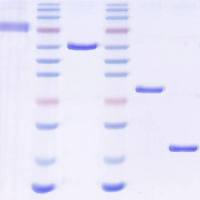PCR-SSCP Analysis of Polymorphism: A Simple and Sensitive Method for Detecting Differences Between Short Segments of DNA
互联网
452
Polymerase chain reaction single-strand conformation polymorphism (PCR-SSCP) (1 ) is a simple method that allows one to rapidly determine whether there are sequence differences between relatively short stretches of DNA. Coupled with sequence analysis, SSCP is an extremely useful method for both identifying and characterizing genetic polymorphisms and mutations. The theory of SSCP is that the primary sequence and the length of a single stranded DNA fragment determine its conformation when it is resolved in a nondenaturing polyacrylamide gel. Even single-base differences can cause different secondary conformations and thus result in different migration rates of the DNA strands. Radioactive nucleotides are incorporated into the DNA strands by PCR, making it possible to detect the DNA by autoradiography. SSCP has been widely used to identify mutations in host genes such as p53 (2 –5 ) and in viruses, such as simian immuno-deficiency virus (SIV), during the course of infection (6 ). SSCP has been used to identify and characterize polymorphisms in a variety of genes (7–9) and was effective in characterizing alleles of linked genes present in individual sperm (10 ).









